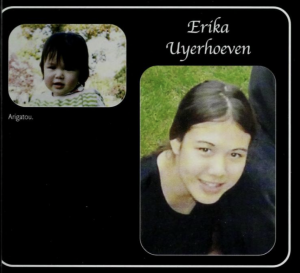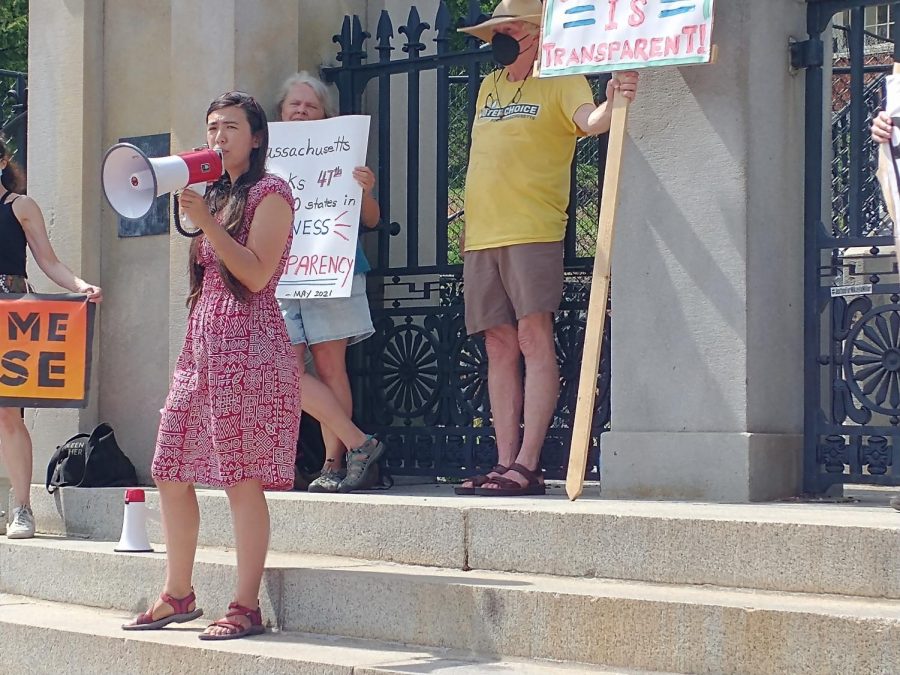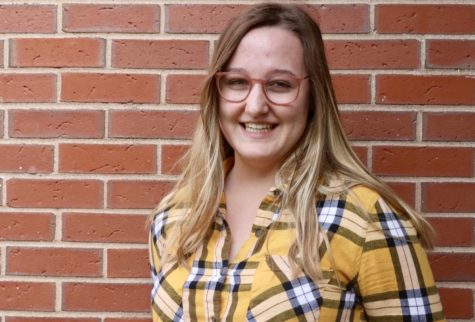WHS Grad Erika Uyterhoeven fights for equity in the MA legislature
Rep. Erika Uyterhoeven, Wayland High School grad class of 2006, at a rally for state house transparency in June 2021. Uyterhoeven serves in the Massachusetts legislature. Uyterhoeven was inaugurated on Jan. 6 2021. “I firmly believe it’s not just about electing me and then i just do whatever I want,” Uyterhoeven said. “I work hand in hand with constituents.” Credit: Joanna Barrow
November 17, 2021
Wayland High School graduate Erika Uyterhoeven, class of 2004, was inaugurated as the is the representative for 27th Middlesex District in the Massachusetts House of Representatives in Jan. 2021. Since assuming her position, Uyterhoeven has advocated on behalf of a myriad of issues relating social justice though the legislature.

Erika Uyterhoeven’s (her last name is misspelled in the photo) senior yearbook spread. After Wayland High School, Uyterhoeven earned a bachelor’s degree from Wellesley College in 2010, a master’s degree from the University of Toulouse in 2014 and a master’s in business administration (MBA) from Harvard Business School in 2019.
Before turning her professional attention to the political sphere, Uyterhoeven was an antitrust economist, which she said entails “analyzing the damage corporations cause when they break the rules of this market.” Uyterhoeven cited working on Bernie Sander’s 2016 presidential campaign—she was a national field organizer—as a transformative experience that initiated her into the world of state level advocacy. She has worked as a trainer and workshop facilitator for the Massachusetts Teachers Association, as well as a trainer for Mass Alliance. She co-founded Act on Mass, an organization pushing for MA House of Representatives rules reform.
Below is a conversation with Uyterhoeven on what inspired the move to work in state government, what she’s done so far and her advice for young people looking to pursue politics.
This conversation has been edited for clarity and length.
What brought you to your role today as a member of the MA legislature?
If you asked me five years ago if I would have been in politics, I would have been like, no. I was actually working in antitrust economics. That’s when companies break the rules of the market, and antitrust is the series of laws that keep companies accountable. I got interested in state level advocacy in particular because I think the state house is so remarkable in people’s lives but not in their conscience. The federal government is very big and makes a lot of big decisions, but they’re quite removed from people. They’re all in D.C. They represent several hundred thousand people. And then on the other side, you have your local government, which is very close—with your town meeting person, you can get to know them. The state government is this weird in between where there’s not as much media. The federal government obviously has all this big media paying attention to them, and local government is very close, but the state government is a little further removed from people but we make all these super consequential decisions for so many of the issues that I really deeply care about: the climate crisis, racial justice, economic justice and increasing income and wealth equality. It’s funny because I used to just be going along in life going, okay, I have to get a job, and pay the bills and all those things. When I started to do organizing, that completely changed everything for me. The world we’re living in is mine. It’s my responsibility to help create through organizing and working with the community the world I believe in.
Was it a difficult decision to decide to run for office and make that career jump?
Oh gosh, yes. Running for office is a difficult choice no matter what. I think that it’s not a decision you make in a vacuum. When there’s an opportunity to run or a vacant seat, that’s a big commitment. You have to put yourself out there and you’re in the public eye. Its one of the hardest things I’ve ever done, but also the most rewarding things I’ve ever done. When you run for office, it’s like the world is your oyster in terms of what you want to stand for, what you want to fight for and what you want to prioritize. I’ve talked to multiple other people about their decisions to run for office, and it’s never easy. It’s a big part of your life and it takes a lot of time, energy, blood, sweat and tears. It’s a little scary because you’re about to jump over the edge, and there’s a lot of what if’s. It’s always a leap of faith. My predecessor had served for 15 years, and before her, that person had served for 15 years. It’s not everyday these seats open up, so it’s a big deal for our whole community, too.
What goes into a campaign for state representative?
There’s plumbing and poetry for campaigns. It depends on how many voters you’re running for. If you’re running for city council, like 4,000 people, there’s only so many people you need to talk to to get elected. That’s a lot more door to door, talking one on one with people. On the other end of the spectrum, there’s running for president, which is 350 plus million people. It’s a lot more debates, tv appearances, big media interviews. I’ve worked on presidential races and I’ve worked on local races, and they’re very different in that way. It’s less making calls and more talking to journalists. It’s a lot more localized and it’s a lot more personal. I don’t love the media circuit type stuff. I find it very performative and tiring.
The plumbing is the same for every single campaign. It’s super straight forward you have to get 51% of the vote. If you get more than that, great, but you have to get that 51%. To run a campaign, you’re saying here’s how many votes I have to earn and how many people I have to talk to to get those votes. My race was closer to that city council side where I knock on—I can’t remember now how many—but about 11,000 doors. There’s 30,000 registered voters in my district which is a fair number and about half of them voted in my race.
The poetry is what’s different. The poetry is the message ‘what am I running on?’ What are the issues? Are there any wedge issues? In any race, there are different ways the narrative can work out. There can be identity differences. There’s AOC [Alexandria Ocasio-Cortez] versus her opponent. She’s a young, Latinx woman of color running against an old white man who’s been there forever. My race was myself and another fairly young, progressive person. We were quite similar in a lot of people’s eyes, and then throughout the campaigning there were some issue differences that became quite clear which affected the message that I told people. The poetry that came into play later on from all these questionnaires and forums we had. I was the only candidate that supported medicare for all, debt free higher [education] and defunding the police.
Poetry is really different race to race, and I think when you get to the larger campaigns, they tend to be all poetry. In local races, it’s a mix. You have to be able to do both. To be able to talk to voters, you have to raise money. It’s not rocket science. It’s remarkably straightforward, but the poetry part can get quite complex.
What are some issues you really care about?
I’m going to zoom out really far, but I’m just going to say for me I think we have a really deep responsibility for everyone to live their lives with dignity and respect. And what I mean by that is we all deserve a good quality education, housing, healthcare and a livable climate. We need to actively dismantle white supremacy through challenging power and policies that put white people above people of color. That reflects in every policy area that you can imagine, whether that’s healthcare, housing, education or transportation. I need to look at these problems with that racial justice lens and understand they are all intersectional problems.
I need to do this in partnership with movements, activists and also my community. That’s the case with any elected office. If anyone comes in saying ‘I’m going to do this alone’ they’re either delusional or they’re lying to you. So for me, I really admire the climate justice movement and particularly the climate justice movement led by youth, so I’ve taken their lead on what they want. One of my priorities is to file this bill called IPCC by 2030. It’s named after the IPCC report and basically it says if we’re serious about stopping the climate crisis in ten years, which is what the time we have, this is what we would have to do as a state. I’m also really passionate about anti-racism in our public schools and creating a curriculum that centers on students of color, our lived experiences and our identities. So that’s another issue and bill I’ve been working on in addition to just school funding. There’s a very converted effort, a corporate driven effort that I would say is driven and emboldened by white supremacy, to dismantle our public schools and ensure inequitable funding. So I’d say at the state level we need to ensure that we have equitable funding so that regardless of which zip code you live in or where you’re born, you have access to a good education.
How does your role as a state representative allow you to do that work?
What do state representatives do? Basically, it’s very similar to the federal government. You have the president, senate and congress. The executive branch runs an administration, which has different sectors—in our case that could be MassHealth, the Department of Conservation, the Department of Transportation. The other branch of government holds that branch accountable, which is the House of Representatives and Senate. So that means that as a legislator, my role as one of the 160 state reps is to hold the governor accountable.
The way we do that is by filing bills, advocating for bills, speaking on issues and helping push issues forward in our legislature. So when I zoom in and look at the day to day, it’s really writing legislation and putting it forth, and then organizing your own community or across other communities to push for those issues. I filed a bill with the Sunrise Movement, on the IPCC by 2030. I work closely with the Sunrise Movement and the Sunrise Boston hub as well as other hubs on how to push this bill forward: how can we get this in front of the legislature, how it becomes the bill we have the big conversations about and then vote on once it’s there. You have to build that support from across the state. We’ve been strategizing on how we reach different parts of the state, the different levers of power we want to pull, the people we want to be talking to and all that.
I have constituents who reach out to me and are like, hey there’s this problem, is there something we can do about it? And the answer is, well, I can see if the administration is doing something about it, and if not, maybe I can file a bill. We actually just had this one anti-racism in schools. Someone was like, there [should be] this other component of the bill [that addresses how] racism is very much connected with mental health. People have to heal from racism and hate crimes. Where’s the support for that? That’s a huge issue. So the next step is to ask, is this something anyone’s tackled before? Then we go to law: has anyone filed something like that before? Is there anyone who can help us draft that language? Who should be in it? Those are some examples of what it means to be a state rep or legislator at a state level. The federal government is a very similar model, but they’re dealing with very large populations. I represent 40,000 people, not 700,000.
Could you tell me more about the role constituents play in the process?
Constituents are my boss. I represent 40,000 people, and they’re my boss. Your state rep is your boss, too. Constituents might reach out to me and say they have this issue. If it’s a state level issue, my office can help you. If it’s a federal issue, like “I have a problem with my passport or immigration,” I’ll connect them to our congressperson. If it’s a municipal issue, I’ll put them in contact with the right person in their municipality. So that’s an example of how to serve constituents.
Constituents reach out about their support of bills. I get lots of emails about that, and some of [the bills] I already support. Someone today emailed me supporting the moratorium on prison construction and I’m like, “hell yeah, me too!” I basically say I’m happy to help support you however I can in terms of passing this bill. It’s not my bill, but I can provide constituents with support if they want to write an op-ed that they want to get published in a paper, or maybe there are letters or testimony [they] want to submit. This is an issue that affects incarcerated people, so another question is if they know people who have family members incarcerated or formerly incarcerated people or currently incarcerated people who would write about this? Can we elevate their voices?
I’ll also be very upfront. Sometimes constituents ask me to support things I don’t support, and I have to explain why I don’t support it and communicate that. I’ve had constituents say, “I don’t believe in a woman’s right to choose for abortions,” and I’ve been like, “Sorry, I don’t agree with you, and here are my reasons. Happy to discuss this further.”
That’s kind of my view on how I engage with constituents and how constituents engage with state government. For me the role of the legislature, because we’re the closest to our constituents—the governor doesn’t have that same level of closeness to constituents—it’s my job to convey what my constituents values and beliefs are. I firmly believe it’s not just about electing me and then I just do whatever I want. I work hand in hand with constituents.
What advice do you have for students interested in pursuing politics or looking to get involved as a young person?
The best foundation for me, always, is organizing. Politics without organizing is like the left hand never talking to the right hand. So one thing I recommend if you’re a young person interested in politics, especially if you’re excited or passionate about an issue, is looking for what is out there.
When you poke around your community or interest areas, the world is your oyster. What Sunrise is doing is super awesome, Act On Mass is super awesome. You can also get to really local level issues. There’s always a lot going on, so it’s just a question of finding your home and getting your feet wet there. The organizing framework and lens is so important. I use it all the time. If you don’t understand how to work with movements and organizers, what is there? If no one’s with you, you can go work for corporate lobbyists.
When you’re in high school and going to college, you have time to try things out. What you like, what you don’t like. You figure out what your calling is. I always recommend trying new things and getting out of your comfort zone, especially when you’re young. I think you should always do that. It really is a time in your life when you have the flexibility to try new things out.





![Last Wednesday, the Wayland School Committee gathered to discuss a number of topics regarding the health curriculum and Innovation Career Pathway course. Another large topic of conversation was the ways to potentially mitigate distracting cell phone usage. "These [phones] are going to distract your learning and social relationships," Superintendent David Fleishman said. "That's concrete right there."](https://waylandstudentpress.com/wp-content/uploads/2025/06/Screenshot-2025-06-04-at-9.49.31 PM-1200x886.png)

























